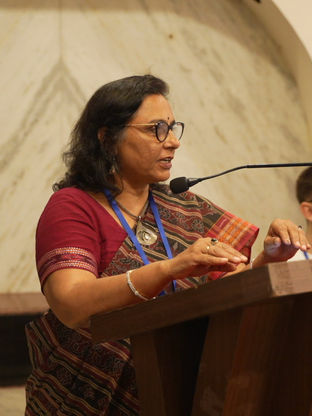
Thank you for attending the
SAFER SUMMIT
Here you will find the most important findings
Way Forward
The Safer Summit fostered a unique space for collaboration, convening a diverse range of stakeholders. NGOs, private sector partners, community members, and even government officials came together to exchange ideas. A central theme emerged: the critical role of community-led, bottom-up development. Through lively discussions, we explored the advantages and hurdles inherent to this approach. These valuable insights illuminated a path forward for improved implementation of bottom-up strategies in development projects, especially those tackling the pressing issue of climate change. The group discussions delved deeper into the specific challenges encountered, with the key findings reserved for the next section.

Group Discussion
Bridging the Gap:
Centering Community Ownership in Sustainable Development
During the Summit the inclusion of the following characteristics for sustainable bottom-up development could be agreed upon: Community Involvement 1.Any organization has to meet with community and its representatives diving deep into the conditions of the population to ensure community interests and ownership are respected before starting any intervention 2.Organizations have to respect the diversity in the communities and integrate them in the planning of any activity 3.Community led development has to actively be accessible to anyone of the community so that all socioeconomic backgrounds are represented and development benefits everyone, especially the most vulnerable 4.The involvement of farmers should be the priority, enabling them to be active, aware and interested about the process of problem identification and problem tackling 5.To make sure the community is getting involved in the process of leading a project, cultural activities can be used to build trust and interest, especially in areas like rural Odisha Knowledge sharing and collaboration 6.Collaboration between different communities and village-to-village communication as well as the formation of self-help groups is crucial 7.Knowledge should be shared and not imposed by experts and advisors, and decisions should be taken together putting the beneficiaries in the position of choosing the best solution for them 8.Collecting data about different environmental features and sharing them in a local language should be used to deepen the knowledge and help making better decisions 9.It’s important to promote the peer learning process Community Empowerment and Advocacy 10.For the advocacy process it’s fundamental to strengthen the relationship between the community and the institutions/committees 11.It is important to ensure participation, equality and transparency (PET) at community level to guarantee the results of the advocacy actions 12.Community leaders have to be chosen by the community and have to fulfill their role voluntarily 13.Institutionalize the community monitoring system, so that the advocacy process can function and be owned by the community
Listen to Sumitra Jena's Story
Mr. Dilip Pattanaik, Executive Director of OSVSWA, has extensive experience in management, program, and resource development. Mr. Pattanaik specializes in international program design and evaluation across various sectors, partnership development, and volunteer leadership. He has worked globally in diverse, multicultural environments.
Speaker Information
Mr. Eduardo Cardoso – a European Corps Volunteer is a dedicated professional in public affairs and international development. In India, he co-founded SAFER ODISHA to protect agriculture from climate risks. Mr. Cardoso is committed to addressing global climate challenges through international climate policy.
Ms. Abha Mishra is the UNDP Head in Odisha, specializing in sustainable development and poverty alleviation. She has extensive experience in managing development programs, fostering partnerships, and promoting community resilience
Ms. Shipra Saxena is a WASH Specialist and CCES Focal Point at UNICEF in Bhubaneshwar. With extensive experience in water, sanitation, and hygiene programs, Saxena is dedicated to improving community health and resilience. She plays a crucial role in developing and implementing strategies to ensure clean water and sanitation access for vulnerable populations.
Dr. Natabara Rout, a hydrogeologist, is renowned for his pioneering work in sustainable agriculture. He has established the Vision Eco-Farm Dr. Rout's efforts have significantly reduced reliance on chemical pesticides and fertilizers, addressing health and environmental concerns in rural communities. His farm serves as a model for integrating traditional knowledge with modern agricultural techniques, aiming to enhance food security and community well-being in coastal Odisha.
Prof. Bipin Bihari Das, a distinguished professor at TISS and a development catalyst, is highly regarded for his visionary outlook and deep human empathy. Renowned as a brilliant thinker, analyst, and strategist in development planning, Mr. Das is known for his innovative and creative approach across various fields. His impactful work at XIMB and TISS has inspired many, making him a revered figure in both personal and professional circles.
Dr.Ambika Prasad Nanda is a distinguished professional with a postgraduate degree in Analytical and Applied Economics and a doctoral degree from Jawaharlal Nehru University (J.N.U), New Delhi. He currently serves as the Head of Corporate Social Responsibility for Tata Steel in Odisha. Dr. Nanda has an extensive background working with various international NGOs, focusing on critical issues such as education, land rights, sustainable livelihoods, climate change, and disaster management.

























